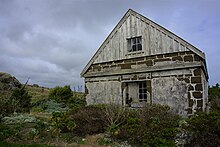
The Chatham Islands (/ˈtʃætəm/ CHAT-əm) are an archipelago in the Pacific Ocean about 800 km (430 nmi) east of New Zealand's South Island, administered as part of New Zealand. The first inhabitants, the Moriori, suffered disease outbreaks from European contact beginning around c. 1800, as well as invasion, genocide, and enslavement in 1835 by the Māori of two iwi from Taranaki.[1] Māori steadily returned to Taranaki over the 1860s, leasing land on the islands to Pākehā herders, who settled and constructed sheep stations on the islands.[1] Registered historic buildings in the Chathams primarily comprise houses and cottages constructed in the late 19th century, following the construction of Hough Cottage (the earliest surviving building on the islands) c. 1860.[2][3]
Heritage New Zealand classification of sites on the New Zealand Heritage List / Rārangi Kōrero, in accordance with the Heritage New Zealand Pouhere Taonga Act 2014, distinguishes between Category 1 ("places of special or outstanding historical or cultural significance") and Category 2 ("places of historic or cultural significance").[4][5] Sites important to Māori or Moriori communities are given special classifications, including Wāhi Tapu for sites of spiritual, traditional, or ritual importance. Ten locations in the Chatham Islands are listed on the New Zealand Heritage List. Nine are located on the main island of Chatham, while one, Whaler's Cottage, is on neighboring Pitt Island.[4] Two additional sites — Hunts Forge on Pitt Island and Zimmerman House at Waitangi West on Chatham — were initially listed as Category 2 sites, but were later destroyed and removed from the list.[6]
- ^ a b Richards, Rhys (12 September 2012). "Story: Chatham Islands". Te Ara: The Encyclopedia of New Zealand. pp. 3–4. Archived from the original on 5 December 2023. Retrieved 8 May 2024.
- ^ "Hough Cottage". Heritage New Zealand. Archived from the original on 27 December 2023. Retrieved 8 May 2024.
- ^ "Historic Places". Chatham Islands Council. Archived from the original on 8 May 2024. Retrieved 8 May 2024.
- ^ a b "New Zealand Heritage List – Rārangi Kōrero". Heritage New Zealand. Archived from the original on 26 March 2014. Retrieved 8 May 2024.
- ^ HNZPTA 2014.
- ^ Dangerfield 2010, pp. 15–16.